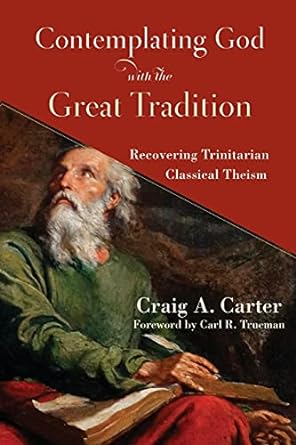A Books At a Glance Book Review
by Ryan M. McGraw
The classic Christian doctrine of God has become frayed at the edges in modern theology, often inadvertently. Via an arresting autobiographical introduction of how he gradually changed his thinking, Craig Carter illustrates how modern theology has lost the ability to hear historical expressions of what he calls “trinitarian classical theism” by failing to challenge the metaphysical underpinnings of the modern world. Replacing divine transcendence with a basic assumption that, if God exists, he must be analogous to the world, if not part of it, is the culprit. Cultivating prayerful contemplation by getting readers “up to speed” with wisdom derived from church history, he writes, “Theology is a lifelong process of constantly starting over” (38). One of his primary contributions is demonstrating that metaphysical assumptions undergirding modern science, historical criticism, and “relational theism” are actually a revival of a pagan mythology, in which God and the world are different degrees of the same order of being. Thus, divine transcendence and incomprehensibility pervade the book, distinguishing the Triune God of Scripture both from all other gods and from everything else. This intriguing book urges readers to think deeper about the doctrine of God by taking them back to Scripture in conversation with the Christian tradition.
In a straightforward three-part movement, Carter defines classical Trinitarian theism, defends it from Scripture, and engages historical theology and contemporary alternatives. Establishing a foundation, chapters one and two define “Trinitarian classical theism” against “relational theism,” and present twenty-five definitional theses. “Relational theism” includes all forms of thought that make God’s relation to the world reciprocal, making him analogous to creation rather than vice versa. Repeated in the appendix for convenience of reference (307-308), his twenty-five theses usefully summarize the implications of divine transcendence for God’s Triunity and attributes, his true relation to the world, and the goal of knowing and worshiping him. The four chapters in part two revolve around searching out the doctrine of God from Isaiah 40-48, which are both a foretaste of Carter’s forthcoming book on Isaiah, and a good model of moving from exegesis, through contemplation on God through biblical texts, to reflection on the metaphysical assumptions behind those texts. In three chapters, he brings his material to resolution by defending the biblical character of the Nicene doctrine of God, the fundamental importance of creation ex nihilo as marking the distinction between the Creator and creation, and exhorting readers to worship the God of Scripture. What makes Carter’s engaging study of the doctrine of God most compelling is his direct challenge to “modern metaphysical assumptions” (271), preventing theologians today from hearing classic Christian teaching. While “metaphysics” may be unfamiliar to many Christians today, Carter digs up the roots of many contemporary problems in ways that can transform how readers think about and relate to God.
Like his earlier work on hermeneutics, Carter’s appeal to “Christian Platonism” will likely draw gazes and raise eyebrows. Yet here he explains more fully why he uses this phrase: “One reason I use the term ‘Christian Platonism’ when I could just as easily use something less controversial, such as ‘Nicene metaphysics’ or even ‘the philosophical implications of the Christian doctrine of creation,’ is because Platonism is so reprehensible to the modern mind” (127; see 290). For Carter, “Christian Platonism” means combining “general and special revelation into a synthesis of reason and faith so as to give the most comprehensive account of reality possible for human beings to give” (266-267). Noting that “some readers have reacted with suspicion” to the term (289), he follows Lloyd Gerson, as he does in earlier writings, by defining “Ur-Platonism” as “antimaterialism, antinominalism, antimechanism, antiskepticism, and antirelativism” (290). Put positively, “Christian Platonism” affirms the existence of the soul and spirituality, existing things as really based on forms in divine ideas, divine providence, that there is truth, and that it is possible to receive truth through divine revelation. Though this reviewer still thinks that Carter and some of his students still use “Christian Platonism” too often in contexts not admitting adequate explanation, his explanations here sound concerns that will resonate with many readers.
One intriguing proposal is Carter’s insistence on inter-disciplinary theological studies to offset the influences of modern metaphysics in theology. He argues, “Anyone who wishes to do theology of any sort” must gain basic competence at least in philosophy, historical theology, biblical languages and hermeneutics, biblical introduction, the history of interpretation, and biblical and dogmatic theology (296). While this task is daunting in several respects, it reflects sound instinct by urging theologians to upend modern philosophical assumptions at every turn, reintegrating a classic and biblical doctrine of God into biblical commentary as well as systematic theology.
Carter’s conclusion to chapter nine is on target: “We need to be less concerned in passing fads in a decadent and declining culture and much more concerned with the permanent things” (303). This book gives readers “permanent things” by reinstilling confidence that the Triune God revealed in Scripture and known by the church are one and the same. Contemplating God is thus an excellent starting point to start reading and hearing differently and better by displacing often unnoticed modern assumptions about how we understand and interact with God.
Ryan M. McGraw
Greenville Presbyterian Theological Seminary
